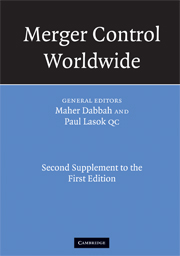Book contents
- Frontmatter
- Contents
- List of contributors
- Table of cases
- Table of legislation
- Introduction to the Second Supplement
- Introduction to the First Supplement
- 1 Argentina
- 2 Armenia
- 3 Australia
- 4 Austria
- 5 Belgium
- 6 Brazil
- 7 Canada
- 8 Chile
- 9 China
- 10 Denmark
- 11 European Union
- 12 Germany
- 13 Greece
- 14 Iceland
- 15 Italy
- 16 Japan
- 17 Republic of Korea
- 18 Malta
- 19 Mexico
- 20 The Netherlands
- 21 New Zealand
- 22 Norway
- 23 Singapore
- 24 Spain
- 25 Switzerland
- 26 Taiwan
- 27 Ukraine
- 28 United Kingdom
- 29 United States of America
- Index
26 - Taiwan
Published online by Cambridge University Press: 30 July 2009
- Frontmatter
- Contents
- List of contributors
- Table of cases
- Table of legislation
- Introduction to the Second Supplement
- Introduction to the First Supplement
- 1 Argentina
- 2 Armenia
- 3 Australia
- 4 Austria
- 5 Belgium
- 6 Brazil
- 7 Canada
- 8 Chile
- 9 China
- 10 Denmark
- 11 European Union
- 12 Germany
- 13 Greece
- 14 Iceland
- 15 Italy
- 16 Japan
- 17 Republic of Korea
- 18 Malta
- 19 Mexico
- 20 The Netherlands
- 21 New Zealand
- 22 Norway
- 23 Singapore
- 24 Spain
- 25 Switzerland
- 26 Taiwan
- 27 Ukraine
- 28 United Kingdom
- 29 United States of America
- Index
Summary
Relevant legislation and statutory standards
The Fair Trade Law of 1991 (FTL) and the Enforcement Rules to the FTL are the principal pieces of legislation concerning mergers and acquisitions, unfair competition and monopolies in Taiwan. The FTL and the Enforcement Rules were last amended in February 2002 and June 2002, respectively. The Guidelines for the Handling of Combination Filings were first promulgated in July 2006 (the “Guidelines”). Article 6 of the FTL places mergers and acquisitions in the broader category of “combinations of enterprises”. The amendments to the FTL and its related Enforcement Rules have changed the filing process for combinations from an approval system to a notification system.
Decision-making bodies and enforcement authorities
At the national level, the Fair Trade Commission (FTC) is the government authority regulating mergers and other types of combinations under the FTL. The FTC is empowered to examine and investigate possible violations of the FTL and to take action against violators by imposing fines and other penalties. The FTC is also empowered to order the dissolution of any combinations that violate the provisions of the FTL. The FTC will investigate complaints against combinations that are effected without the consent of the FTC, but may also investigate matters on its own initiative.
Notification requirements and procedures
Combinations subject to notification in Taiwan
Transactions that fall under the broad category of “enterprise combinations” under Article 6 of the FTL and meet one of the jurisdictional thresholds set forth below must be notified to the FTC in advance.
- Type
- Chapter
- Information
- Merger Control WorldwideSecond Supplement to the First Edition, pp. 141 - 150Publisher: Cambridge University PressPrint publication year: 2008

